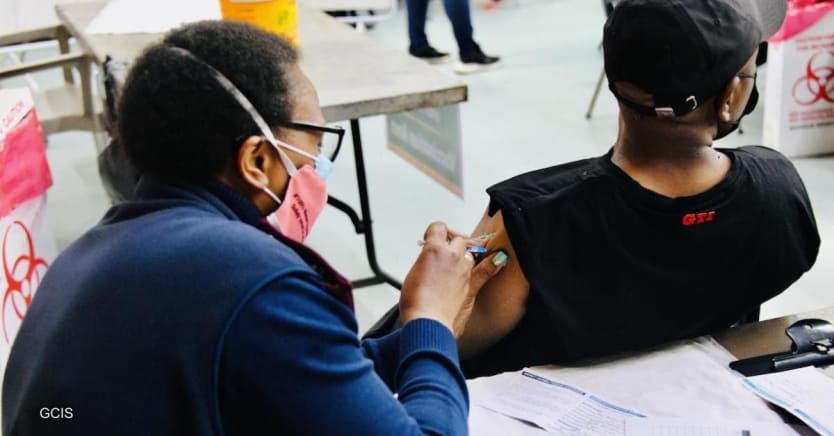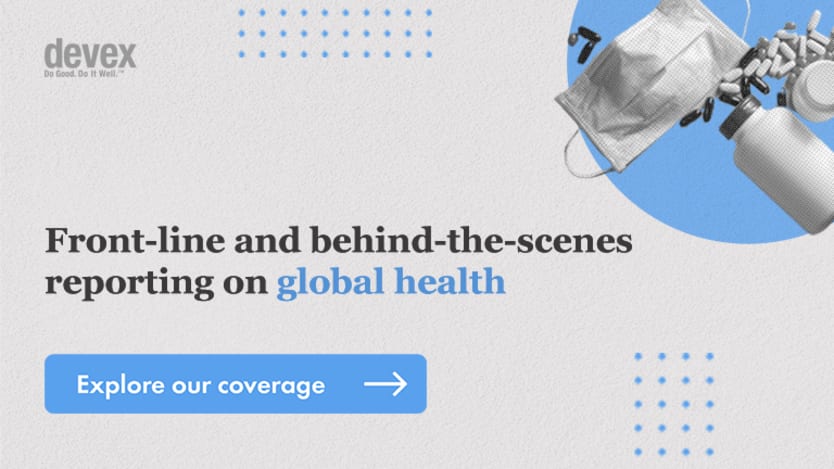
Access advocates and health experts have called on governments of high-income countries to urgently address vaccine inequity amid the emergence of the omicron COVID-19 variant. More variants are likely to emerge if vaccine inequity continues, but they’re concerned that not enough is being done to fix it, and instead, the focus has been on travel restrictions.
“The knee-jerk responses of many governments to cut off travel from African countries has taken a lot of the attention from the real issue: that we will continue to see more dangerous variants emerge and prolong this pandemic until and unless we get the entire world vaccinated and protected,” said Carolyn Reynolds, co-founder of the Pandemic Action Network.
“Omicron is the smoke alarm that the world is on fire; we need the global fire brigade to come urgently and do whatever it takes to get more jabs in arms faster.”
— Carolyn Reynolds, co-founder, Pandemic Action NetworkThe network together with 40 organizations published an open letter last week calling on world leaders to “do whatever it takes to get the world vaccinated as quickly as possible and ensure every country is equipped to spot newly emerging variants, fast.”
Omicron’s emergence is not a surprise, but it is the “latest cost” to inaction on vaccine equity, Reynolds said.
“We are heading into year three of this deadly and costly pandemic, and world leaders have still failed to come together around a plan to end this crisis. Where is the leadership? Where is the plan? Meanwhile, people are dying and suffering needlessly. It is shameful,” she added.
Is omicron changing perceptions and policies on vaccination?
Sign up for Devex CheckUp
The must-read weekly newsletter for exclusive global health news and insider insights.
There’s been some evidence that populations in some high-income countries with high vaccination coverage have been willing to donate a percentage of their countries’ doses.
But data has shown that donations of doses have been slow, and recent statements from COVAX, the global vaccine-sharing initiative, and its partners have underscored the need for donated doses to be of quality, which includes providing early notice and predictability in donations, and making sure that donated doses have at least a shelf life of 10 weeks when they arrive in countries.
“We think the public has been ahead of the curve of many of their governments especially in wealthier countries in recognising that everybody benefits from ensuring that global vaccine inequality is tackled,” Iain Byrne, Amnesty International’s researcher on economic, social, and cultural rights, wrote to Devex via email.
He said new variants such as omicron “will only reinforce those views.” However, it’s not translating to concrete action at the government level. A number of high-income countries continue to oppose the TRIPS waiver at the WTO, and there’s been an “inadequate” transfer of resources, skills, and technology to support low-income countries in their vaccine rollouts, he said.
“Sadly it seems that it will only take more deaths, more hospitalisations before high income governments get the message that they need to do more – donate more vaccines and accompanying resources to where they are most needed; stop blocking the TRIPS waiver; invest longer term in health systems so that we are all better prepared for future pandemics,” Byrne said.
1 billion doses: The cost of COVID-19 booster shots
The United States has announced it will give its population booster shots of COVID-19 vaccines, despite pleas from the World Health Organization to prioritize equitable global access.
In the United States, Reynolds said there’s been an increase in the number of people getting vaccinated or deciding to get a booster shot in response to the threat of omicron. Early this week, vaccinations in the U.S. reached about 1.8 million based on a seven-day average, up from 1.3 million a month ago, she said.
However, it’s not the same for everyone, particularly in low-income countries, where vaccination rates remain very low. For months, countries in Africa grappled with supply constraints, hesitancy, and insufficient capacity to deliver the vaccines into people’s arms.
“The U.S. and several countries have made additional pledges in recent days to accelerate the pace of global vaccination, which is welcome, but we need to do much more and much faster,” Reynolds said.
“Omicron is the smoke alarm that the world is on fire; we need the global fire brigade to come urgently and do whatever it takes to get more jabs in arms faster,” she said, adding that the growing demand for booster shots in high-income countries should not lead to further widen existing gaps.
According to the World in Data, vaccinations in the African continent have dropped since South Africa reported the new variant to WHO on Nov. 24. But individually, some countries have shown an increase in vaccinations. In South Africa, where the government has struggled with its vaccine rollout for months due to a combination of supply constraints and hesitancy, over 55,000 doses have been administered since the discovery of omicron, and anecdotal reports suggest people are being encouraged to get vaccinated because of the new variant.
WHO’s Strategic Advisory Group of Experts on Immunization said Wednesday that third doses, or booster shots, should only be given to people who received inactivated vaccines, and those who are immunocompromised. Examples of inactivated vaccines are those made by Chinese manufacturers Sinovac and Sinopharm.
The advisory group also said more data is needed for it to be able to make recommendations on the use of vaccines amid the emergence of omicron.
SAGE Chair Dr. Alejandro Cravioto said that apart from delta and omicron, eight other variants of COVID-19 have come up and that have been studied and assessed, “and they have not been considered relevant in any way.”
“I think in the case of omicron we have to be careful of what exactly is known, what exactly needs to be known for us to assess how it will behave. But I don't think we have to make another statement before we have real evidence on things that are coming up. And as with the other eight variants, we might end up with something that is not as dangerous as was felt at the beginning,” he said.
Countries at the Global COVID-19 Summit led by U.S. President Joe Biden in September agreed to support WHO’s target to vaccinate 40% of countries’ populations by the end of 2021, and 70% by mid-2022. But WHO Director-General Tedros Adhanom Ghebreyesus said last week that more than half of 103 countries that have yet to reach the milestone are at risk of missing the target.









